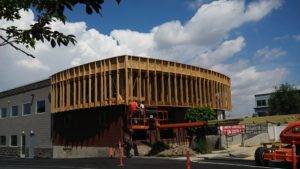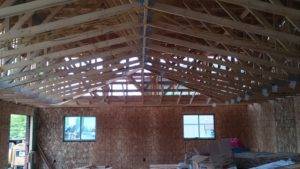Commercial Framing Utah County
Commercial Considerations: Products and Approaches in Commercial Framing
Commercial and industrial framing projects differ sharply from residential renovation in several ways. One of these is the variety of materials used to meet or exceed building safety codes. Below, the experts at Hawkeye Framing walk through the options and types of material generally used in commercial projects, touching upon specific differences between these and industrial framing endeavors
 Metal or Wood
Metal or Wood
While many industrial projects call for metal framing, depending upon the needs of the particular space, wood framing is both adequate and preferable for many commercial contexts. What is most vital when considering carpentry is the quality of the lumber supply. This consideration, coupled with the expertise of the framing contractors, can determine the success of any non-residential renovation project.
Insulation and Soundproofing
When conducting a business renovation, framing contractors must consider the aspect of multiple occupancies or multipurpose use of a site. In addition to a variety of insulation types, soundproofing is often desired. Blown in insulation and blanket-style products may be perfectly adequate for residential use and some commercial endeavors, but foam insulation and prefabricated panels can provide both superior energy efficiency and sound dampening in the event that this is required.
Drywall
Today, the quality of sheetrock and its mold-inhibiting attributes are offered to residential, industrial, and commercial framing projects. However, framing contractors in Utah are well versed in the different requirements for each of these contexts. Unlike residential applications, sheetrock for commercial framing and building renovation must withstand additional traffic. Even the daily presence of a higher number of human occupants can put potential stressors on materials that private spaces will never experience. Hence, along with slightly more robust framing construction, contractors will use more durable drywall products and finishing treatments. This ensures that any commercial space will retain its structural and aesthetic integrity. One of these criteria is fire and water resistance. True, home projects also incorporate this consideration. However, business endeavors require additional protection against damage. In a commercial or industrial context, this can make the difference in human safety. Specially designed panels are available for code-specific projects in non-residential areas that provide this protection. The same may be said of interior doors used in these contexts—metal sheathed or solid-core doors are not typical of domestic structures, but they are standard features for many business and industrial projects.
Hardware and Interior Finishing
 Just as commercial and industrial projects require additional measures or enhancements for soundproofing, water and fire protection, insulation, and finishing, so too do they necessitate different screws, bolts, nails, and fasteners. This hardware is often crafted to endure greater stressors than those to which residential project materials will be exposed over the lifetime of the structure.
Just as commercial and industrial projects require additional measures or enhancements for soundproofing, water and fire protection, insulation, and finishing, so too do they necessitate different screws, bolts, nails, and fasteners. This hardware is often crafted to endure greater stressors than those to which residential project materials will be exposed over the lifetime of the structure.
Hawkeye Framing has a long history of commercial context framing, and our experts know precisely the standards to which they must work. Our long history in the business also allows us to source the best, most cost-effective materials that meet or exceed commercial and industrial code requirements because we have worked hard to cultivate contacts that provide superior materials.